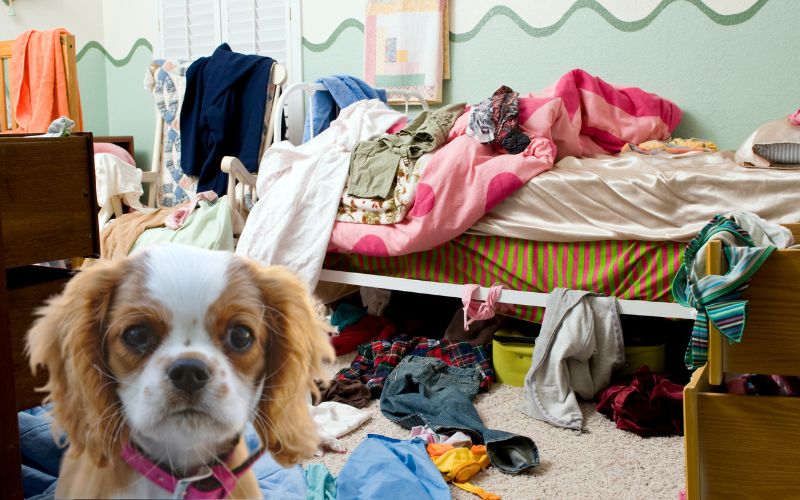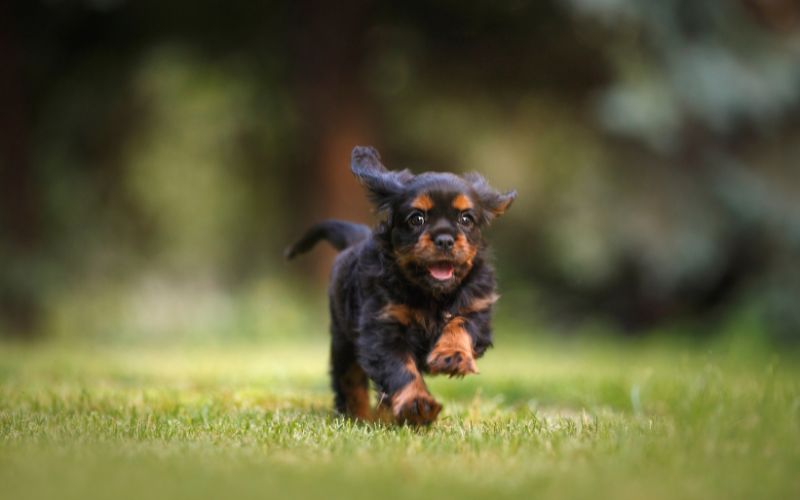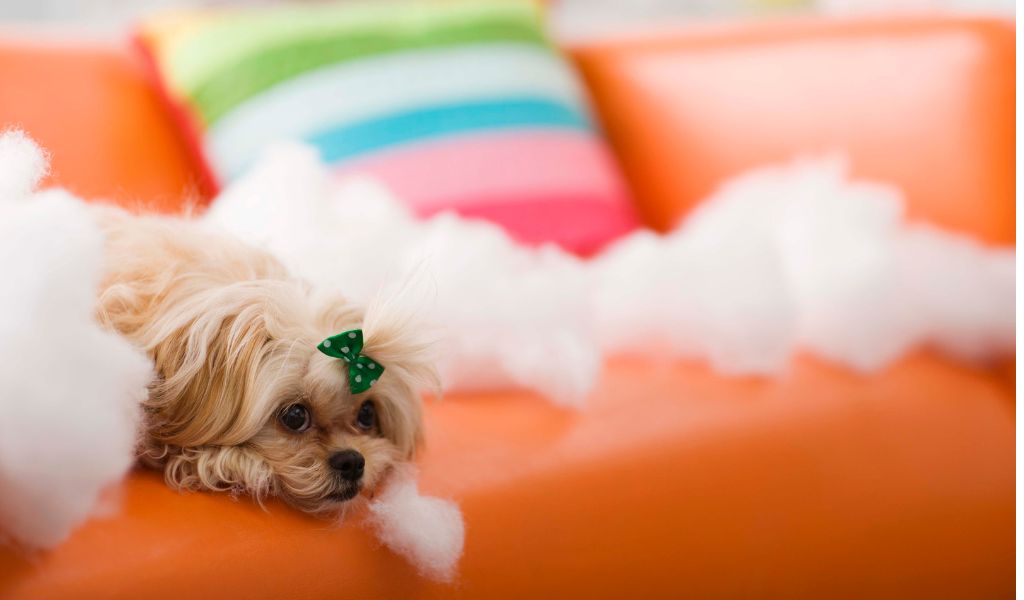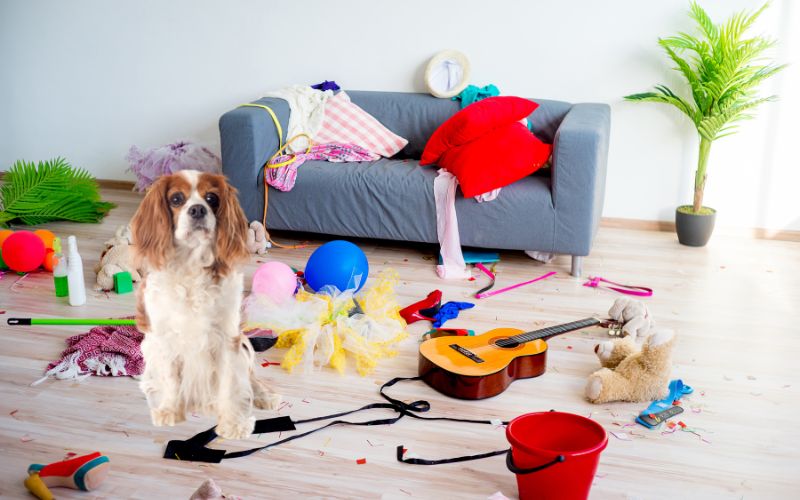If you are thinking of a Cavalier King Charles spaniel as a pet then you might be wondering if they are chewers and potentially destructive.
Any dog can be destructive and this is true of Cavalier King Charles spaniels. A dog that is anxious, stressed or poorly cared for can become destructive and can display a range of associated behaviours.
The personality of Cavalier King Charles spaniels
Cavalier King Charles spaniels are gentle, loving and affectionate dogs.
They are also playful and friendly, which means they can get carried away when playing with their toys or chewing on things around the house.
How they are raised as puppies
If Cavalier King Charles spaniels are not properly trained or socialised as puppies, they can become anxious when left alone and start to chew on things around the house out of boredom or stress.
It is important to provide your puppy with plenty of chew toys and bones to gnaw on, as well as training them from a young age so that they know what is acceptable to chew on and what isn’t.

The home environment
If a Cavalier King Charles spaniel is left alone in an environment that is not conducive to their needs, such as a small apartment with no outside space, they can become anxious and destructive.
It is important to provide your dog with plenty of space to run and play, as well as plenty of toys and chew items to keep them occupied.
Anxiety when left alone
Cavaliers can become anxious when left alone, which can lead to destructive behaviour.
If you are going to be away from home for long periods of time, it is important to provide your dog with a safe place to stay, such as a crate or dog-proofed room.
Take your Cavalier out for a good walk, run or some other form of exercise before you leave. This will tire him out making it much more likely that he will sleep while he is alone.
How to handle destructive behaviour
If your Cavalier is exhibiting destructive behaviour, it is important to identify the reason why.
Many dogs, of all breeds, will chew out of sheer boredom.
Chewing often gives a dog something to do and a way to expend energy.
If you work long hours and your Cavalier is left home alone all day, he may start chewing to relieve boredom.
The easiest way to combat destructive behaviour due to boredom is by ensuring that your Cavalier gets plenty of exercise.
A good rule of thumb is that a dog should get at least 30 minutes of exercise per day for every hour that he is left alone.
If you cannot provide this much exercise, consider hiring a dog walker or enrolling him in doggy daycare.
A tired dog will normally go to sleep when provided with the opportunity and will be less tempted to chew or do ‘other things to keep busy’ when he is alone.
If anxiety is the cause of your Cavalier’s destructive chewing, you will need to take steps to reduce his stress level.
This may include providing him with a safe place to stay when you are away from home, such as a crate or dog-proofed room.
You may also need to increase the amount of exercise he gets, as well as provide him with plenty of chew toys and bones to gnaw on.
Leave a radio or the TV on
I’ve often found that simply leaving a radio on low volume on a soothing station can help the dog to relax – the sound of the music and people talking helps to create a feeling of companionship for the dog.
If your dog is anxious when you go out then give this a try.
It has always helped anxious dogs that I have had and it can make a difference.

If you are struggling with your Cavalier’s destructive behaviour, then remember that your vet is always a good source of advice.
Your vet will be able to examine your Cavalier for any underlying medical conditions that could be aggravating the behaviour and can also support an anxious dog with treatment when necessary.
Preventing destructive behaviour
The best way to prevent your Cavalier King Charles from becoming destructive is to provide him with plenty of exercise, training and stimulation.
A Cavalier will need at least two good walks a day, totaling at least an hour of exercise.
If you cannot provide this much exercise, consider hiring a dog walker or enrolling him in doggy daycare.
In addition to walking, you should also play games with your Cavalier such as fetch and tug-of-war.

These games will help to tire him out mentally as well as physically and will reduce the likelihood of destructive behaviour.
You never know if the dog will chew while you are out so the old adage of ‘out of sight out of mind’ is a good one to follow.
If you are unable to provide your Cavalier with his own safe space then you should remove any items that you don’t want to risk being chewed.
Training your Cavalier
While it is difficult to train a dog to not chew there are plenty of training activities that you can do with your Cavalier to stimulate his brain and tire out his body.
Mental stimulation is a great way to tire your dog, most dogs find concentration to be tiring and, as a tired dog is generally a well behaved dog, some training can help with destructiveness.
You could try some basic obedience training such as teaching your Cavalier to sit, stay or lie down on cue.
You could also try some more advanced tricks such as roll over or playing dead.
Cavalier King Charles spaniels are very intelligent dogs and are quick learners so they should be able to pick up new tricks relatively easily.
There are also plenty of toys available that can help to keep your Cavalier’s mind active when you are not around.
Remember, if your Cavalier is chewing then there could be a number of underlying reasons.
It is important to try and identify the root cause of the problem so that you can help your dog to overcome it.
Do your best to provide your Cavalier with good quality exercise, undertake some training and play games with him.
Tired dogs are good dogs and won’t need to keep themselves entertained by chewing the sofa.
As always, if you are struggling then speaking to your vet can really help. They will be able to offer support and advice tailored to your individual dog.




